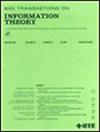Variable-Length Feedback Codes Over Known and Unknown Channels With Non-Vanishing Error Probabilities
IF 2.2
3区 计算机科学
Q3 COMPUTER SCIENCE, INFORMATION SYSTEMS
引用次数: 0
Abstract
We study variable-length feedback (VLF) codes with noiseless feedback for discrete memoryless channels. We present a novel non-asymptotic bound, which analyzes the average error probability and average decoding time of our modified Yamamoto-Itoh scheme. We then optimize the parameters of our code in the asymptotic regime where the average error probability误差概率不消失的已知和未知信道上的变长反馈码
我们研究了针对离散无记忆信道的无噪声反馈可变长度反馈(VLF)编码。我们提出了一种新的非渐近约束,分析了我们改进的 Yamamoto-Itoh 方案的平均错误概率和平均解码时间。然后,我们优化了渐近机制下的代码参数,在渐近机制下,当平均解码时间 N 接近无穷大时,平均错误概率 $\epsilon $ 保持不变。我们的二阶可实现性边界是 Polyanskiy 等人(2011 年)可实现性边界的改进。我们还开发了一种不依赖于底层信道参数知识的通用 VLF 码。我们的通用 VLF 代码采用经验互信息作为解码度量,并将 Polyanskiy 等人(2011 年)的代码通用化。我们推导出了通用 VLF 码的二阶可实现性约束。我们对 VLF 码和通用 VLF 码的研究结果被扩展到具有平均功率约束的加性白高斯噪声信道。前者比 Truong 和 Tan(2017)的可实现性边界有所提高。我们对通用 VLF 代码结果的证明使用了类型方法的改进版和非线性更新理论文献中的渐近展开。
本文章由计算机程序翻译,如有差异,请以英文原文为准。
求助全文
约1分钟内获得全文
求助全文
来源期刊

IEEE Transactions on Information Theory
工程技术-工程:电子与电气
CiteScore
5.70
自引率
20.00%
发文量
514
审稿时长
12 months
期刊介绍:
The IEEE Transactions on Information Theory is a journal that publishes theoretical and experimental papers concerned with the transmission, processing, and utilization of information. The boundaries of acceptable subject matter are intentionally not sharply delimited. Rather, it is hoped that as the focus of research activity changes, a flexible policy will permit this Transactions to follow suit. Current appropriate topics are best reflected by recent Tables of Contents; they are summarized in the titles of editorial areas that appear on the inside front cover.
 求助内容:
求助内容: 应助结果提醒方式:
应助结果提醒方式:


